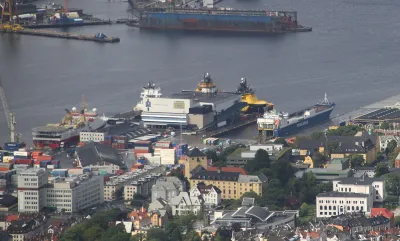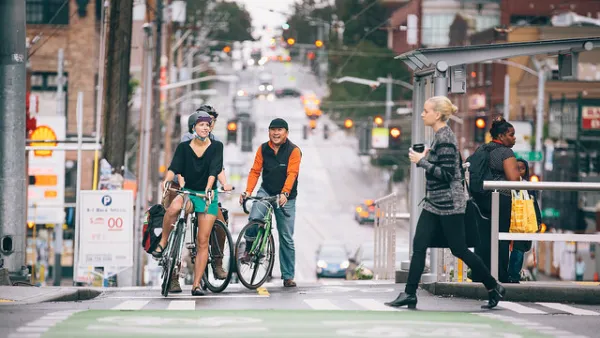As it winds down port operations in the area, Bergen plans to transform its Dokken district from a busy shipping hub to a car-free, 'regenerative' zone.

A coastal district of the Norwegian city of Bergen is preparing to become a zero-emissions neighborhood. As Adele Peters writes, "[t]he project is still in the planning stages, as the city runs workshops to involve residents in the creation of the neighborhood. But a new proposal illustrates what the area, which will include affordable housing, businesses, and other services, might look like."
With much of the land in the area owned by the city, Bergen leaders see this as "the opportunity of the century," a chance "to set high goals for what we want city development to be," says Laura Ve, who leads the development program for the Dokken district. The goal is to create a car-free zone "filled with people on foot and bikes" where "[e]verything is easily accessible based on low-impact mobility" and residents can easily connect to light rail and ferries.
"The design aims to create a 'regenerative' city, not just a sustainable one." The city plans to add new green space to "reconnect the public to the North Sea, with nature-based strategies used to protect the area from flooding caused by heavy storms, heat waves, and sea-level rise." While it's impossible to completely eliminate environmental impacts, the project aims to "find alternatives to fossil fuels in production, capture emissions, and even incorporate emissions into the finished product" for construction materials and "carefully calculate the full life cycle impacts of each decision."
Flemming Rafn, a founding partner at Tredje Natur, the Copenhagen-based architecture firm that worked on the project with designers at Entasis, Matter by Brix, and MOE, says, in addition to reducing carbon emissions, "the new neighborhood can demonstrate how tackling environmental challenges can also improve the local quality of life."
FULL STORY: How to redesign a neighborhood for zero emissions

Analysis: Cybertruck Fatality Rate Far Exceeds That of Ford Pinto
The Tesla Cybertruck was recalled seven times last year.

National Parks Layoffs Will Cause Communities to Lose Billions
Thousands of essential park workers were laid off this week, just before the busy spring break season.

Retro-silient?: America’s First “Eco-burb,” The Woodlands Turns 50
A master-planned community north of Houston offers lessons on green infrastructure and resilient design, but falls short of its founder’s lofty affordability and walkability goals.

Test News Post 1
This is a summary

Analysis: Cybertruck Fatality Rate Far Exceeds That of Ford Pinto
The Tesla Cybertruck was recalled seven times last year.

Test News Headline 46
Test for the image on the front page.
Urban Design for Planners 1: Software Tools
This six-course series explores essential urban design concepts using open source software and equips planners with the tools they need to participate fully in the urban design process.
Planning for Universal Design
Learn the tools for implementing Universal Design in planning regulations.
EMC Planning Group, Inc.
Planetizen
Planetizen
Mpact (formerly Rail~Volution)
Great Falls Development Authority, Inc.
HUDs Office of Policy Development and Research
NYU Wagner Graduate School of Public Service




























